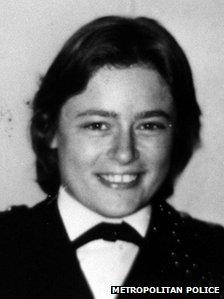Libya PM lays wreath at London memorial to PC Yvonne Fletcher
- Published
PC Fletcher was shot while policing a protest against the Gaddafi regime at the Libyan embassy in St James's Square
Libya's interim prime minister Abdurrahim El-Keib has laid a wreath at the spot where PC Yvonne Fletcher was shot dead in London in April 1984.
PC Fletcher, 25, was shot while policing a protest against the Muammar Gaddafi regime at the Libyan embassy in St James's Square and later died.
Mr El-Keib bowed in front of the memorial and laid a wreath of white roses and carnations.
He also had a private meeting with PC Fletcher's family.
They said in a statement they "looked forward to the investigation progressing" and were pleased Met Police officers had been issued with visas to continue the inquiry into her death in Libya.
Officers had previously failed to get permission from Libyan authorities for such a visit.
It was agreed during talks between Mr El-Keib and Prime Minister David Cameron on Thursday, with dates still to be decided.
'Diplomatic immunity'
Scotland Yard has never charged anyone with PC Fletcher's murder, even though the shots that killed her were fired from inside the Libyan embassy.
Staff there claimed diplomatic immunity and were deported.
Diplomatic ties between Libya and the UK were severed following the murder of PC Fletcher.
Her shooting sparked an 11-day siege of the Libyan embassy.
Mr El-Keib, who was in exile during Col Gaddafi's regime, has promised Libya would "work very closely together" with the UK to help with any questions during the investigation.
He told Mr Cameron that the "Fletcher case" was "very close to my heart".
He added: "I had friends who were demonstrating that day next to the embassy.
"It is a sad story. It is very unfortunate that it has anything to do with the Libyan people."
'Special values'

Diplomatic ties between Libya and the UK were severed following the killing
Fresh hope that PC Fletcher's killer might be eventually found was raised in 2011, after Col Gaddafi was toppled in the Libyan revolution.
Later in a talk on post-Gaddafi Libya at the independent policy institute, Chatham House, Mr El-Keib said life had changed within a short span of time since the the dictator was overthrown last October.
Freedom of press, human rights and transparency have emerged as cornerstones of life, Libya's interim prime minister said.
"These are special values that caused the revolution to take place," he said.
Mr El-Keib said under Col Gaddafi the nation "was a country where Libyans felt like aliens" and people lived "as close as you can get to the poverty line".
- Published21 September 2011
- Published24 May 2012
- Published9 February 2012